
by Purnima Ramakrishnan | Jun 11, 2014 | 2014, Brazil, Cultural Differences, Culture, Eye on Culture, India, Purnima, Sports, The Alchemist, World Interviews
Every four years, a large part of the world’s attention descends on one nation – for World Cup Football. Tomorrow, the FIFA World Cup actually starts, and as you all know, the first match is in Sao Paulo, where Brazil takes on Croatia. I was on the phone with fellow World Moms Blog editor, Jennifer Burden, and she asked me if India is excited for the World Cup.
My own family has World Cup fever, inspired by my recent trip to Brazil to report on world poverty and environmental issues, but when I think of the whole of India excited about something sport-related, it is really only cricket that comes to mind!
People in India will watch the World Cup games, but it won’t compare to our country’s level of excitement over cricket.
When it comes to sports, India is a cricket-crazy nation.
INDIA.IS.A.COMPLETE.CRICKET-CRAZY.NATION!
Men, women and kids all watch and/or play and/or have favorites and/or conduct mass prayers and/or do just crazy things for the sake of cricket. There is really no end to it!
Sachin Tendulkar, a cricket player, is like a God to everyone in India. And there is absolutely no limits to what people would do for cricket. It is not just a game. Cricket has a very special life and a very special relationship with this country. It cannot even be explained, however, living in India during the cricket season would say it all.
Let me entertain you with a few crazy things that go on in India around cricket…
People color themselves with the tricolor Indian flag. The tricolor theme is not just clothes and caps, but you can find it also in the school premises, in apartments (flats) — theentire nation in is the colors of the Indian flag for the cricket. The celebrations are as intense, if not more, (ok, I have to be honest- it is the most celebrated event) than even Diwali or the Independence Day.
Check out this picture of a school in Western India where the school children are rooting for the Indian cricket team.

And then people just form throngs everywhere during the actual time the game is telecast. Office-goers, housewives, school-children, get together wherever there is a TV and watch. Homeless people watch cricket on the TV sitting on the streets across an electronics shop (or TV shop). No, they aren’t driven away. Because it is cricket season.
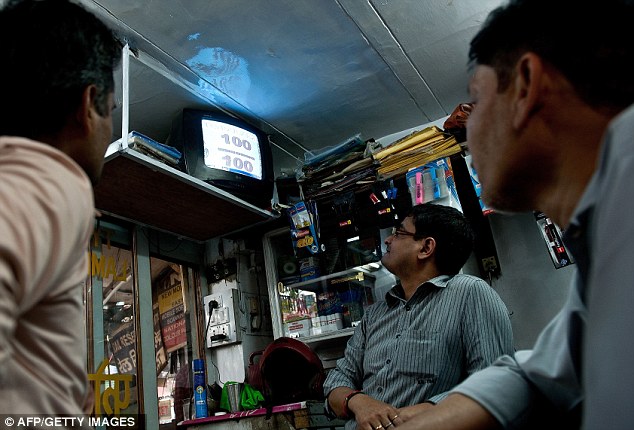
Shopkeepers let the customers watch the match from the shop indefinitely
There are common TV viewing holes in villages like the local tea-stalls, community centers, even movie theaters at times, a common TV in the square of the slum. Oh, there is no end to this kind of thing. These pictures to do the job of explaining the craziness cricket causes for the people of India and the rest of sub-continent countries (Pakistan, Sri Lanka and Bangladesh).
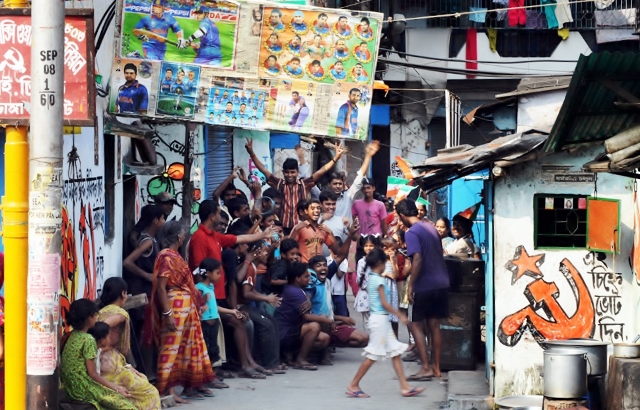
A tea stall hosting the TV viewing of the cricket match to a gathered crowd of the villagers
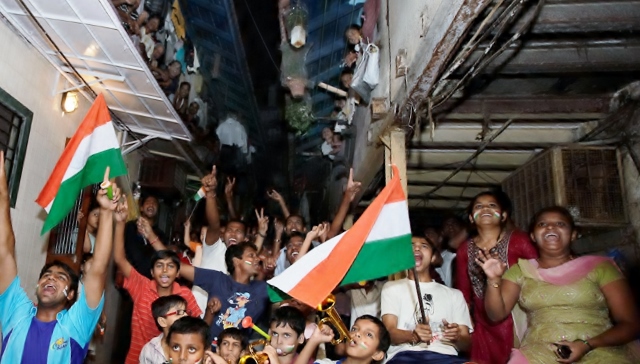
The slum dwellers watching the cricket match from a local TV-hole in the slums.
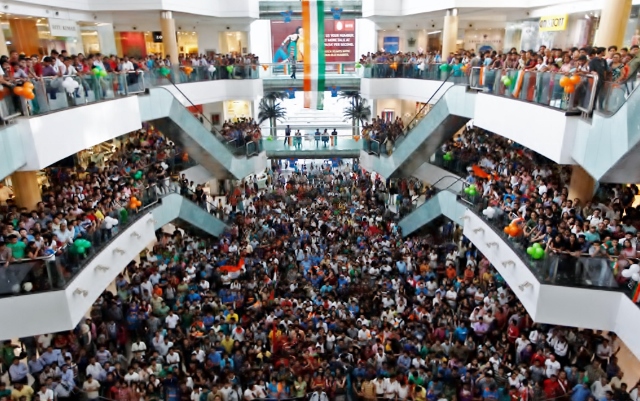
This is a mall in Kolkatta where the finals of the match between India and Sri Lanka is viewed.
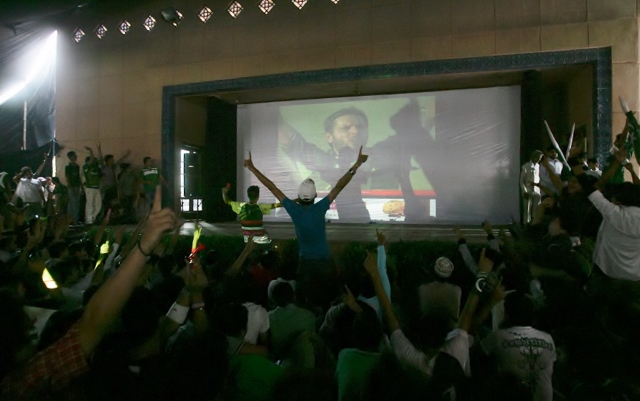
This is a movies theater in Karachi, Pakistan where cricket is telecast during the cricket season.
So, now coming back to the FIFA World Cup to be held in Brazil, all that I would say is that, the temperature is slightly lukewarm in comparison to the fever of the cricket playing nation.
Yes, we do talk a lot about it. But I guess that is about it. And, perhaps, some real football fans would watch it because they are really that – football fans.
By the way, did you catch Brazilian World Mom, Eco Ziva’s, post on the World Cup this week?
So what happens in your country? Is it a football-crazy country too? Or does your country live for some other sport?
Photo credit to the author, The Daily Mail and The Atlantic.
This is an original post to World Moms Blog written by Purnima Ramakrishnan, our Senior Editor from India.

by Mannahattamamma (UAE) | May 21, 2014 | 2014, Awareness, Cultural Differences, Education, Expat Life, Feminism, Girls, Government, Human Rights, Nigeria, Politics, UAE, USA, Women's Rights

In March, I wrote a post in honor of Gloria Steinem’s birthday, in which I mentioned that when Steinem spoke at my college graduation way back in the 1980s, my friends and I had wished for a speaker who was more “relevant.” In our innocence, we believed that Steinem had won her fight; we were graduating from a women’s college and thought that fight for gender equality had been more or less won.
More than two decades later, I wish I could say that Steinem was irrelevant and that gender inequality is something we only read about in the history books.
When I wrote that post about Steinem, I was thinking about the Common Core curriculum, which relegates women’s contributions to history to the sidelines. Now, of course, we are all confronted with the horror that’s unfolding in Nigeria, and while the plight of those schoolgirls devastates me, it has become, in my mind, another instance in a long list of the ways in which groups (comprised mostly of men) attempt to score political points by seizing control of women’s lives. As an example, think about the Tea Party conservatives in the US, who prove their conservative bona fides in the United States by voting against support for Planned Parenthood, or Head Start, or universal kindergarten, or…
What is so scary about educating a girl? In the middle ages, accusations of witchcraft were often leveled against women who had amassed too much wealth or land, or who in some way differed from those around them. We teach our children that things like the Salem witch trials happened because “people didn’t know better” or because of “mass hysteria” but sometimes I wonder how far we have progressed since those days. What happens to women who challenge the status quo–or who have the potential to challenge the status quo? Don’t they still run the risk of being punished, whether literally or figuratively?
It’s funny to me now, but when I first moved to Abu Dhabi the two most obvious indications that we’d left Manhattan behind—besides the searing heat—were the adhan and the abaya-clad women: religion and covered bodies. I found the abayas more unsettling than the call to prayer, even as I sometimes envied the women their public invisibility. The longer we live here, however, my perceptions have changed so that I no longer see hijab as an automatic symbol of oppression or subjugation or second-class citizenry.
I would imagine, however, that as women here, we’ve all had moments where we’ve felt marginalized, silenced, lesser: the day I trotted down the sidewalk to get in a waiting cab and the cab driver chastised me by saying “women should not run, madam, I will wait, and you should walk.” Or when a guard at the border crossing into Oman looked over at the passenger seat where I was sitting (in long trousers) with one foot propped on the dashboard and told me “to put my foot down, sit like a lady, more properly, sit properly.” When that happened my first impulse was to laugh: surely he couldn’t be serious? But, of course, he was serious. I put both feet on the floor and looked at the map so that I didn’t toss out a few well-chosen swear words. (A general rule regardless of where you are: don’t swear at anyone, male or female, who is wearing a uniform at a border crossing.)
So yes, in that instance, I was silenced as I suppose I was by the cab driver too, who took it upon himself to offer some unsolicited advice. And yes, there is now a slight internal pause before I leave the house as I run through a kind of inner checklist about what I’m wearing: if short sleeves, a long skirt or pants, or vice versa (long sleeves, shorter skirt or shorts); do I have a shawl (equally for frigid air conditioning and bare shoulders); if I’m going to the beach, I make sure that my beach cover-up is more than a ratty t-shirt. There are days where I know I’ve failed the checklist and am too busy or late to care, but overall, I dress more modestly now than I used to and probably that’s not a bad idea: no one needs to see a fifty-year-old woman slopping down the street in cut-off shorts and a tank top.
Am I being repressed, or respectful? Does my feminism mean that I yell at the cabbie, keep my foot defiantly on the dashboard, saunter down the street in a halter top and tight jeans? Or, alternatively, does feminist politics remind us that silencing and the policing of women’s bodies happens—sadly—in almost every culture in the world, including the US? Without making light of the specifics of being female in this region, I’ve come to think of the issues facing women in this part of the world as being differences in degree, not kind, from the problems facing women in other parts of the world.
What do we, as women, do to help other women and girls find their voices–find our own? How do we create strength to silence those who would silence us?
This is an original post to World Moms Blog by Deborah Quinn in the United Arab Emirates of “Mannahattamamma.”
After twenty-plus years in Manhattan, Deborah Quinn and her family moved to Abu Dhabi (in the United Arab Emirates), where she spends a great deal of time driving her sons back and forth to soccer practice. She writes about travel, politics, feminism, education, and the absurdities of living in a place where temperatures regularly go above 110F.
Deborah can also be found on her blog, Mannahattamamma.
More Posts
Follow Me:


by Sarah Sensamaust | May 14, 2014 | 2014, Africa, Being Thankful, Cultural Differences, Expat Life, Family, Living Abroad, Motherhood, Parenting, Relocating, Stress, World Moms Blog
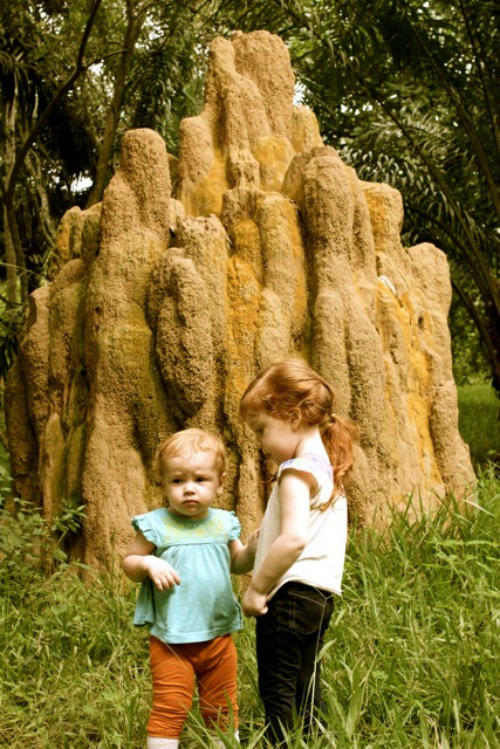
That’s a termite mound, not a rock!
I’ve reached a time in my life when it’s easy to be anxious about so many things. I think that most mothers of small children, whether living abroad or not, are often plagued by the anxiety bug.
For the last six years, my family and I have lived in Congo and we’re moving away in just a few weeks. I find myself thinking back to all those worries, big and small, that I had about raising two kids in the proverbial “heart of darkness.”
So as an exercise of gratitude and reassurance before we begin our next African adventure, I’ve been reflecting on all the what-ifs –real and imagined – that never came true.
Those mosquito bites never led to malaria.
There were no broken bones, stitches or other ailments that couldn’t have otherwise struck us in the United States.
Getting stopped by the police was never more than a hassle and a good story.
Our girls made it to and from school every day without incident.
We never ran out of quality disposable diapers, Sensodyne toothpaste, or anything else we hoarded from home.
My shoes held up.
Every fever went away without too much suffering.
Nothing was ever stolen (that we noticed).
No one was bitten by a snake or spider and a few worms in the feet were no big deal.
The termites never swarmed and carried our children away.
The vehicles always returned to their respective lanes before a head-on collision.
No one was lost in an angry mob.
We never got sick from all that “questionable” food.
That crazy Congo lightning never came through our window and zapped me in my bed.
Both of my pregnancies were picture perfect.
The electricity always came back on.
The water always returned.
The internet was always repaired.
The planes did not crash.
We made friends. Good, lifelong friends.
And no one is worse for the wear.
As infinitely grateful as we are for all these things that never happened, we’re even more so for everything that did. We had two beautiful children, our family learned a new language and we reached far out of our comfort zone. We will forever be connected to the culture and people we grew to love in Congo.
I hope that the next time everyday stressors take over, I’ll be able to stop and think about this list and remember more often than not everything is alright in the end.
What things have you worried about that never ended up happening?
This is an original post written for World Moms Blog by Sarah Sensamaust. You can find Sarah blogging with Jill Humphrey at Mama Congo.
Photo credits to the author.

by Katinka | May 12, 2014 | 2014, Adoption, Adoptive Parents, Awareness, Being Thankful, Child Care, Childhood, Communication, Cultural Differences, Family, Health, Inspirational, Mental Health, Motherhood, Parenting, Penguin and Panther, Relationships, Special Needs, Stress, World Motherhood, Younger Children
 Even before I became a mother, I had a particular wish for my future children. Looking back at several not so fond memories of my childhood, I vowed I would do everything for them to have a better one. They shouldn’t have to grow up too fast. They would not have to feel unwanted, misunderstood or worthless. I would guard their innocence and happiness like a hawk.
Even before I became a mother, I had a particular wish for my future children. Looking back at several not so fond memories of my childhood, I vowed I would do everything for them to have a better one. They shouldn’t have to grow up too fast. They would not have to feel unwanted, misunderstood or worthless. I would guard their innocence and happiness like a hawk.
The major driving force behind the different attempts of therapy I tried throughout the years, was the well-being of my (future) kids. I wouldn’t allow mistakes in motherhood.
In fact, I didn’t want them to become like me at all. Just like the mother who really tries hard not to show her child how much she is freaked out by spiders, in order not to raise a little arachnophobic like herself. My list of not-to-pass-ons was just longer: low self esteem, perfectionism, fear of failure, social clumsiness, easy overstimulation and of course CFD: ‘continuously fretting disorder’.
The first five years of motherhood, I had the impression I could accomplish all this. I actually felt like the perfect mother: patient, involved, crafty, warm. I even managed to stick to my not-to-pass-on-list. It would cost me quite some effort, but I would not interfere when my son was building a crooked tower, so he could not catch my perfectionism. Trying not to pass on perfectionism while desperately trying to be a perfect mother. It may sound absurd now, but back then, it totally made sense.
Three years ago, my perfect balance in motherhood shifted drastically. When our son turned five, we couldn’t ignore anymore that he was going to develop at a speed different from his peers. At the same time, our adopted daughter arrived, aged two and a half.
They both forced me to face my demons better than any therapy has ever done throughout the years.
My son and I, we discovered developing an intelligence and sensitivity far beyond our physical age, is a struggle we share. Where his friends will watch a grazing cow on a field trip and complain about the stench, he will likely try to understand why this mammal has four stomachs, how to measure the circumference of the pasture and how long it would take for the cow to eat all that grass. And how much dung it would have produced by then, of course. His sense of humour is still a seven year old’s.
My daughter and I, we’ve been battling childhood trauma and attachment disorder together. We cried together in the shower numerous times, holding each other fiercely. The battle has been rough. It still is. Sometimes I just can’t comfort her like I should, because I need comforting myself. But she amazes me with a resilience I just can’t manage. She might be jumping on the trampoline and singing imaginary happy-songs, while I crash on the couch to mentally recover from holding her mourning and kicking little body for over half an hour.
It has been extremely painful to see my least fond childhood memories revive in my kids.
Comforting a son that feels like an alien, desperately trying to cover up his super powers because he just wants to blend in. Reassuring a daughter that follows me around the house like a puppy because she just can’t believe she won’t be abandoned again.
Painful. Heart wrenching. And feeding the CFD by the tons.
However, I’m seeing now that our struggles do not necessarily have to be the same. Because, you know, they have me. Of course I can’t protect them from being hurt. No mother can do that for her children. It’s one of the curses of being a mother.
But as it turns out, as a ‘damaged’ mother, I might be the perfect guide for my heavy-hearted children.
I’m teaching my son first handed how to make use of his extraterrestrial powers, without a need to blend in. I’m even coaching him in failing and making mistakes without believe it’s the end of the world. I surely acknowledge how important that lesson is. He’ll get it much earlier than I did.
I’m confidently ignoring outsiders’ advice on how to deal with my daughter’s anxieties, since I recognize how she feels. When she’s grieving, I guard her like an eagle that will not allow anyone to question or mock her tears of grief. I’m determined to give her what I never got. I will make her feel loved and understood. Unconditionally.
Me, I’ve only discovered how to find happiness after a painful and lonely journey.
I intend to show my children all the short cuts.
They will have a splendid childhood.
How do you see your own childhood reflected in your children? Is it mostly warm or can it be painful as well?
This is an original post to World Moms Blog by K10K from The Penguin and The Panther.
The picture in this post is credited to the author.
If you ask her about her daytime job, Katinka will tell you all about the challenge of studying the fate of radioactive substances in the deep subsurface. Her most demanding and rewarding job however is raising four kids together with five other parents, each with their own quirks, wishes and (dis)abilities. As parenting and especially co-parenting involves a lot of letting go, she finds herself singing the theme song to Frozen over and over again, even when the kids are not even there...
More Posts

by Tinne from Tantrums and Tomatoes | May 5, 2014 | 2014, Awareness, Being Thankful, Belgium, Communication, Cultural Differences, Culture, Eye on Culture, Family, Holiday, Husband, Inspirational, International, Kids, Motherhood, Tantrum and Tomatoes, Traditions, Womanhood, World Motherhood
 These days, the internet is humming with all things Mother’s Day related: special brunches, crafts, gift ideas. All for that special person you get to call ‘Mom’.
These days, the internet is humming with all things Mother’s Day related: special brunches, crafts, gift ideas. All for that special person you get to call ‘Mom’.
Mother’s Day earned its place on the calendar thanks to the efforts of American Anna Marie Jarvis. She organized the first Mother’s Day to commemorate her own mother, Ann Reeves Jarvis, who had helped organise the ‘Mother’s Day Help Clubs’ during the American Civil War. In 1914, Woodrow Wilson decided that Mommy Dearest would get her special day each second-Sunday of May.
Not here. In the rest of Belgium, yes. But not in the province of Antwerp. Here we wait until the 15th of August.
Not because we disdain the second Sunday of May, nor have a problem with holidays coming from across the Atlantic. No, as a matter of fact both the American and Antwerp traditions originated at much the same time.
For Antwerp and its surroundings it all began in 1913 when Antwerp born artist Frans Pieter Lodewijk van Kuyck started the tradition as a way of getting people to pay more attention to family values and social order. Modernisation and the industrial revolution, Mr. van Kuyck felt, had screwed society up a wee bit too much and it was time to take a stand, to defend traditional ways.
And since Mother is at the core of the family, when better to highlight her importance than on the 15th of August, the feast of the Assumption of the Virgin Mary. A Catholic feast already celebrated in Antwerp with a huge procession honouring the Virgin as protector of the city. There already was a party going on anyway, so why not add a little extra?
Mr. van Kuyck was not only an artist, he was also alderman for Culture and Fine Arts of the city of Antwerp. So in this official capacity he set up a propaganda committee, mobilised schools, companies and media into promoting the celebration of Mother. Children were to make a special gift and fathers were expected to buy flowers or jewellery. Brunch had not yet come into fashion then, otherwise I’m sure he would have made it mandatory too.
The rest of Belgium did not follow, but instead adapted the new ‘American’ version. Thus, during May when every other mother in the country smiles her lovely so-happy-with-the-macaroni-necklace smile and updates her Facebook status with pictures of her breakfast in bed/fresh flowers/chocolates/whatever…we trudge on and wait our turn until August.
Have no fear, thanks to the school’s Craft Hour, I too receive a pretty handmade gift from my daughters in May. But my husband still has to buy my flowers in August. Nah.
Does your country have a special Mother’s Day tradition? Or do you celebrate differently?
This is an original post to World Moms Blog from our writer in Belgium, Tinne, of Tantrums and Tomatoes.
The image used in this post is credited to the author.
Born in Belgium on the fourth of July in a time before the invention of the smart phone Tinne is a working mother of two adorably mischievous little girls, the wife of her high school sweetheart and the owner of a black cat called Atilla.
Since she likes to cook her blog is mainly devoted to food and because she is Belgian she has an absurd sense of humour and is frequently snarky. When she is not devoting all her attention to the internet, she likes to read, write and eat chocolate. Her greatest nemesis is laundry.
More Posts - Website
Follow Me:



by ThinkSayBe | Mar 28, 2014 | 2014, Africa, Communication, Cultural Differences, Culture, Economy, International, Language, Life Lesson, Poverty, Travel, Vacationing, World Motherhood
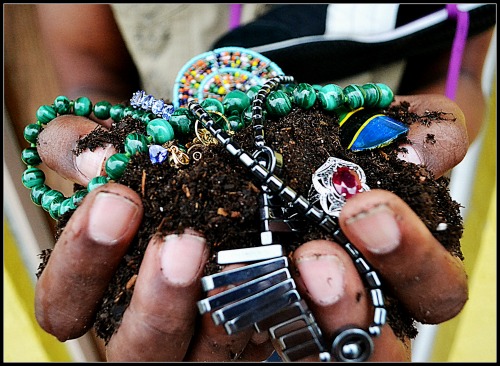 “Hey bro, vipi? How much for these shoes?” I ask the second-hand market vendor.
“Hey bro, vipi? How much for these shoes?” I ask the second-hand market vendor.
“Ah! Those, for you, those are $30 U.S.dollars,” he responds with a tone indicating that he’s giving me a deal. He didn’t know I was Tanzanian, maybe because I hadn’t yet spoken more than a few words in Kiswahili. Words that any foreigner who cared to find out would have known.
“$30?! I can get a new pair of shoes in the U.S. for that amount!” I say in return, flabbergasted by the price this man just gave me.
After a few minutes of haggling, going back and forth about the quality of the shoes, and his realization of my nationality, we do not close the sale of these shoes, but commence having a very important conversation about the poverty of Africa.
I will call this man Peter, as I do not recall his name.
As I talked down the price of the shoes, Peter said things like, “You people have money!” and “Come on, you can pay this amount easily.”
When Peter and I started talking (immediately after I decided not to purchase the shoes), I asked him his reasons behind hiking prices up so high for foreigners. He simply said, “Because we are poor here in Tanzania, and in Africa, so I have to try to earn money some way, and you guests have the money.” (more…)
I am a mom amongst some other titles life has fortunately given me. I love photography & the reward of someone being really happy about a photo I took of her/him. I work, I study, I try to pay attention to life. I like writing. I don't understand many things...especially why humans treat each other & other living & inanimate things so vilely sometimes. I like to be an idealist, but when most fails, I do my best to not be a pessimist: Life itself is entirely too beautiful, amazing & inspiring to forget that it is!
More Posts
Follow Me:























 “Hey bro, vipi? How much for these shoes?” I ask the second-hand market vendor.
“Hey bro, vipi? How much for these shoes?” I ask the second-hand market vendor.


